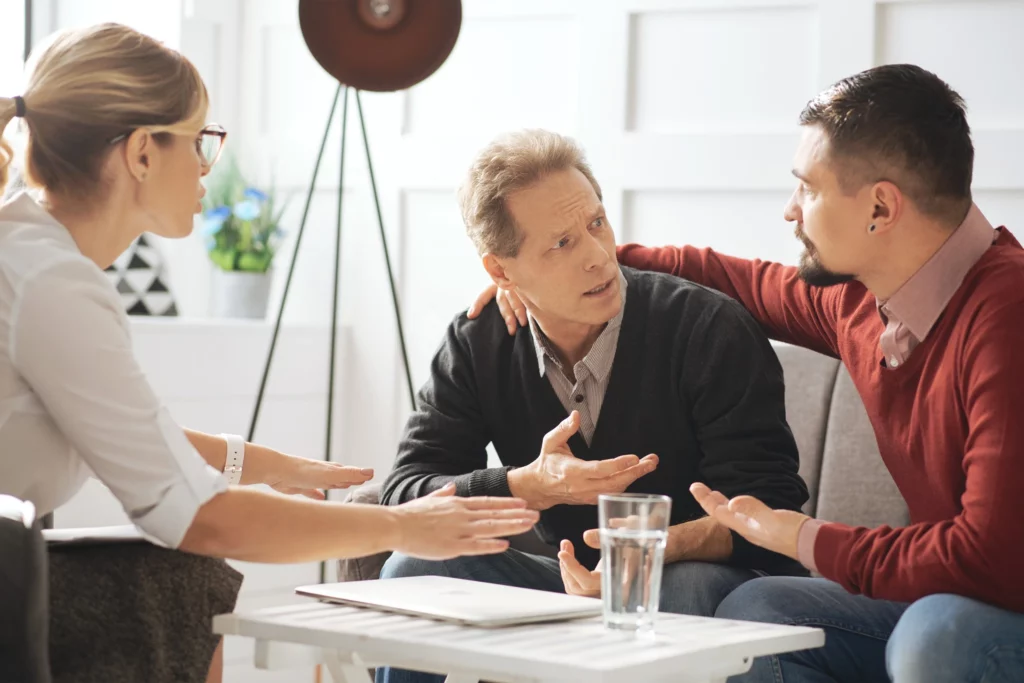In the journey of love, relationships face various challenges that can sometimes become overwhelming for couples. This is particularly true for gay relationships, which can encounter unique obstacles. Gay relationship counseling offers a supportive and nurturing space for individuals and couples to navigate these challenges. In this article, we will delve into the world of gay relationship counseling, & exploring its significance.
Contents
What Is Gay Relationship Counseling?
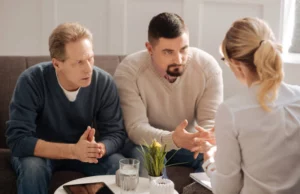 Gay relationship counseling, also known as LGBTQ+ relationship counseling, is a form of therapy specifically designed to support individuals and couples who identify as gay, lesbian, bisexual, transgender, or any other sexual or gender minority. It aims to address the unique challenges and dynamics that may arise within same-sex relationships.
Gay relationship counseling, also known as LGBTQ+ relationship counseling, is a form of therapy specifically designed to support individuals and couples who identify as gay, lesbian, bisexual, transgender, or any other sexual or gender minority. It aims to address the unique challenges and dynamics that may arise within same-sex relationships.
Gay relationship counseling typically involves a licensed therapist or counselor who has expertise and experience in working with LGBTQ+ individuals and couples. The counselor provides a safe and non-judgmental space for clients to explore their concerns, issues, and goals within their relationship.
The primary goal of gay relationship counseling is to enhance communication, improve understanding, and strengthen the overall relationship. It can help couples navigate various issues such as coming out, internalized homophobia or transphobia, discrimination, family acceptance, sexual intimacy, and relationship conflicts.
Importance Of Gay Relationship Counseling
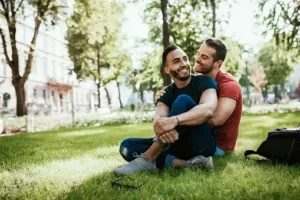 Gay relationship counseling is important for several reasons and all these reasons are containing their own significance as well.
Gay relationship counseling is important for several reasons and all these reasons are containing their own significance as well.
Here we have mentioned a few:
- LGBTQ+Specific Challenges: Gay couples may face unique challenges and issues that are specific to their sexual orientation or gender identity. These challenges can include societal discrimination, family rejection, internalized homophobia or transphobia, and navigating the complexities of coming out.
- Supportive and Affirming Environment: Gay relationship counseling offers a safe and affirming environment where individuals and couples can feel understood and validated. Therapists who specialize in LGBTQ+ issues create a non-judgmental space where clients can freely express their concerns, emotions, and experiences without fear of rejection or discrimination.
- Communication and Conflict Resolution: Effective communication and conflict resolution skills are crucial for any relationship. Gay relationship counseling helps couples develop and enhance these skills in a way that is specific to their needs and dynamics. By improving communication, couples can express their needs, desires, and concerns more effectively, leading to better understanding and resolution of conflicts.
- Relationship Strengthening: Gay relationship counseling focuses on strengthening the bond between partners. It helps couples develop a deeper understanding of each other, build trust, and foster intimacy. Through counseling, couples can explore their shared values, goals, and expectations, and work together to create a stronger and more fulfilling relationship.
- Mental Health and Well-being: LGBTQ+ individuals can face higher rates of mental health challenges, such as depression, anxiety, and substance abuse, due to societal pressures and discrimination. Gay relationship counseling addresses these mental health concerns and provides support for individuals and couples to improve their overall well-being.
Overall, gay relationship counseling is important because it acknowledges and addresses the specific needs and challenges faced by LGBTQ+ individuals and couples. It provides a supportive space for personal growth, effective communication, conflict resolution, and overall relationship well-being.
When You Might Require Gay Counseling?
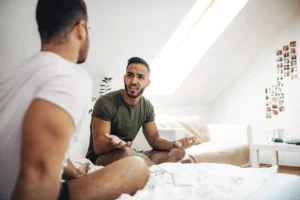 There are various situations when you might consider seeking gay counseling or LGBTQ+ counseling:
There are various situations when you might consider seeking gay counseling or LGBTQ+ counseling:
- Relationship Challenges: If you and your partner are experiencing difficulties in your relationship, such as communication issues, frequent conflicts, or a breakdown in intimacy, gay counseling can provide a supportive and constructive space to address these challenges.
- Coming Out Process: Coming out can be a complex and emotionally charged process. If you are struggling with coming out to family, friends, or colleagues, or if you are experiencing internal conflicts or self-acceptance issues related to your sexual orientation or gender identity, gay counseling can provide guidance and support.
- Discrimination and Stigma: Experiencing discrimination, prejudice, or stigma due to your sexual orientation or gender identity. These can have a significant impact on your mental health and overall well-being. Gay counseling can help you cope with the emotional consequences of discrimination. While building resilience, and developing strategies to manage stress and external pressures.
- Self-Exploration and Identity: If you are questioning your sexual orientation or gender identity. If you are seeking a deeper understanding of your own identity within the LGBTQ+ community. Then gay counseling can provide a supportive environment for self-exploration. A counselor can assist you in exploring your feelings, & clarifying your identity.
- Mental Health Concerns: If you are experiencing mental health challenges such as depression, anxiety, substance abuse, or trauma. Then gay counseling can be a valuable resource. A counselor with expertise in LGBTQ+ mental health can help you address these concerns. While developing strategies for self-care, coping, and resilience.
- Preparing for Transitions: If you are considering or undergoing gender transition, gay counseling can offer invaluable support. A counselor can help you navigate the emotional, social, and psychological aspects of transitioning, including managing relationships, accessing appropriate resources, and addressing any concerns or challenges that may arise during this process.
Remember, seeking gay counseling is a personal decision, and there is no specific threshold or requirement for when to seek help. If you feel that your well-being, relationships, or personal growth can benefit from the support of a counselor with expertise in LGBTQ+ issues.
Approaches Used In Gay Relationship Counseling
In gay relationship counseling, therapists may utilize various therapeutic approaches to address the specific needs and goals of the individuals or couples involved. Here are some common approaches used in gay relationship counseling:
Cognitive-Behavioral Therapy (CBT)
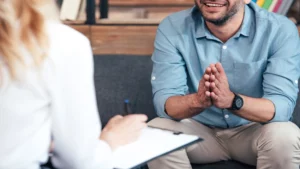 CBT focuses on identifying and challenging negative thought patterns and behaviors that may contribute to relationship difficulties. Therapists help individuals or couples recognize and modify unhelpful beliefs or attitudes, develop effective communication skills, and practice problem-solving techniques. CBT can be beneficial in addressing issues as well.
CBT focuses on identifying and challenging negative thought patterns and behaviors that may contribute to relationship difficulties. Therapists help individuals or couples recognize and modify unhelpful beliefs or attitudes, develop effective communication skills, and practice problem-solving techniques. CBT can be beneficial in addressing issues as well.
Emotionally Focused Therapy (EFT)
EFT emphasizes the importance of emotional connection and attachment in relationships. Therapists help individuals or couples identify and express their underlying emotions, understand their attachment needs, and develop strategies to foster a secure and loving bond. EFT can be effective in addressing issues related to intimacy, communication, and resolving relationship conflicts.
Solution-Focused Brief Therapy (SFBT)
SFBT focuses on identifying and building on existing strengths and resources within individuals or couples. Therapists help clients set achievable goals and develop practical strategies to work towards those goals. SFBT can be effective in addressing specific challenges or transitions in a relationship and fostering a positive and solution-oriented mindset.
Gottman Method Couples Therapy
The Gottman Method is an evidence-based approach that focuses on enhancing relationship satisfaction and fostering healthy communication and conflict resolution skills. Therapists help couples identify relationship patterns, strengthen friendship and intimacy, and develop effective strategies for managing conflicts. This approach can be particularly useful in addressing relationship dynamics.
Mindfulness-Based Approaches
Mindfulness-based approaches, such as Mindfulness-Based Stress Reduction (MBSR) or Mindfulness-Based Cognitive Therapy (MBCT), can be integrated into gay relationship counseling. These approaches help individuals or couples cultivate present-moment awareness, acceptance, and non-judgment. Mindfulness can enhance self-awareness, and emotional regulation, and promote more effective communication.
Narrative Therapy
Narrative therapy explores the stories and meanings individuals or couples attach to their experiences. Therapists help clients deconstruct negative narratives, challenge societal norms, and construct more empowering narratives that align with their values and relationship goals. Narrative therapy can be useful in addressing issues of self-acceptance, identity exploration, and overcoming internalized prejudices.
How To Find The Right Gay Relationship Counselor Near Me?
 Choosing the right gay relationship counselor near you is crucial for a positive counseling experience and therefore, these few crucial steps need to be followed while considering the factors.
Choosing the right gay relationship counselor near you is crucial for a positive counseling experience and therefore, these few crucial steps need to be followed while considering the factors.
Here are some factors to consider when selecting a counselor:
- Expertise and Experience: Look for a counselor who has specific expertise and experience in working with LGBTQ+ individuals and couples. They should have a solid understanding of the unique challenges, dynamics, and issues that gay relationships may face.
- Affirming and Non-Judgmental Attitude: A supportive and affirming counselor is essential in creating a safe space for you to explore your concerns and challenges. Seek a counselor who demonstrates a non-judgmental and accepting attitude towards diverse sexual orientations and gender identities.
- Cultural Competency: Look for a counselor who is culturally competent and understands the specific needs and experiences of the LGBTQ+ community. They should be knowledgeable about LGBTQ+ history, terminology, and the social, legal, and psychological issues that impact gay relationships.
- Personal Connection: Establishing a rapport and feeling comfortable with your counselor is crucial for a successful counseling experience. Schedule an initial consultation or phone call to get a sense of their personality, communication style, and whether you feel a connection.
- Accessibility and Practical Considerations: Consider the practical aspects of counseling, such as the counselor’s location, availability, and fees. Determine whether they offer in-person sessions, online counseling, or a combination of both. Additionally, check if they accept insurance or offer sliding-scale fees to ensure that their services are financially feasible for you.
- Referrals and Recommendations: Seek referrals or recommendations from trusted sources, such as friends, family, or LGBTQ+ community organizations. They may have firsthand experience with counselors who specialize in gay relationship counseling or can provide valuable insights.
Remember, finding the right counselor may require some exploration and trial and error. If you don’t feel a good fit with the first counselor you encounter. Then don’t hesitate to seek out other options until you find someone who can provide the support and guidance you need.
Conclusion
Gay relationship counseling offers a nurturing and supportive space for individuals and couples to navigate the unique challenges and dynamics of same-sex relationships. It promotes effective communication, trust-building, and personal growth within the relationship. By seeking professional help, couples can overcome obstacles, strengthen their bond, and create a fulfilling and lasting partnership. Remember, seeking support is a courageous step towards nurturing and enriching your love. Embrace the journey and embrace the potential for growth and happiness in your gay relationship.
Relationships are complex, and it’s natural for issues to arise along the way. If you have any queries regarding Relationship Counseling experienced therapists at CoupleMantra can help: Book a trial couple therapy session.
